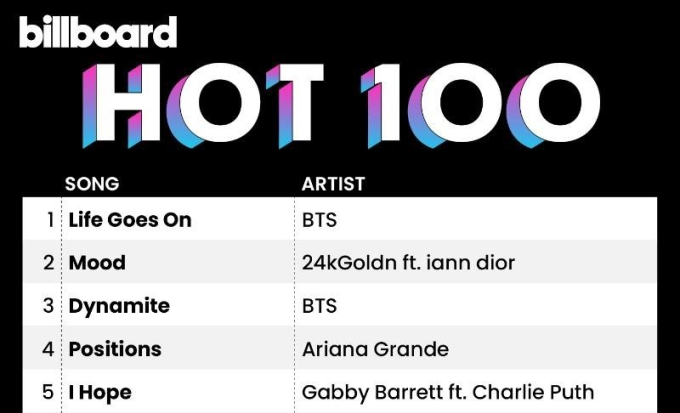K-pop
BTS rewrites pop history as it goes mainstream in US
By Dec 02, 2020 (Gmt+09:00)
3
Min read
Most Read
CarlyleŌĆÖs Rubenstein sees commercial real estate undervalued


Infrastructure secondaries continue to rise amid inflation: Stafford


Goldman Sachs names Choi Seoul office chief


Golf equipment maker Taylormade to refinance $222 mn of debt


NPS' former key players move to law firms as its voting power increases



ŌĆ£One day the world stopped, without any notice ŌĆ” people say that the world has changed ... but thankfully our relationship is still the sameŌĆ”ŌĆØ (translated lyrics from BTS' Life Goes On)
South Korean global pop sensation BTS has topped the Billboard Hot 100 list with Life Goes On, the title track of its latest BE album┬Ā ŌĆō marking the first time in Billboard history that a song sung in Korean has hit No. 1, according to Billboard on Dec. 1.
Life Goes On is sung predominantly in Korean aside from the chorus. It was written by BTS members RM, J-Hope and Suga, who aimed to deliver a message of comfort and hope amid the global pandemic crisis.
BTS REWRITES K-POP HISTORY┬Ā
The latest No. 1 is a historic milestone for BTS, who have been on a record-breaking streak. The group has already topped Billboard's Hot 100 list three times in the past three months.
The group is the first to achieve three No. 1s in such a short period of time or in the span of three months since the Bee Gees' Saturday Night Fever soundtrack album in 1977-1978 ŌĆō over 42 years ago.
The Billboard Hot 100 ranks the top 100 songs based on radio play, online streaming, and sales in the US market. According to Nielsen Music data, Life Goes On streamed 14.9 million times, sold more than 150,000 copies, and drew in 410,000 listeners via radio play in late November.┬Ā

K-POP ESTABLISHES ITSELF IN US MAINSTREAM MARKET
BTS became the first South Korean band to claim No. 1 on the┬Ā Billboard Hot 100 with its single Dynamite in August. The group then reclaimed the top spot in October with a remix version of Savage Love, a song by New Zealand music producer Jawsh 685 and US singer Jason Derulo.
This week, the group's earlier single Dynamite bounced back from 14th place to No. 3, putting two BTS songs in the top five on the Hot 100. The group's BE album also rose to the top spot on Billboard 200, setting a record for debuting both a single and album at No. 1.
ŌĆ£We are truly grateful, just so grateful. Having a No. 1 title is already amazing but to have two of our songs ranked in the top three ŌĆ” we want to sincerely thank ARMY for loving us,ŌĆØ said BTS member Jimin.
According to Billboard, Life Goes On is the ŌĆ£first No. 1 sung mostly in a language other than English since Luis Fonsi and Daddy YankeeŌĆÖs predominantly Spanish-language Despacito" as well as being the first group to boast two No. 1 debuts in Hot 100 history.
ŌĆ£The fact that a Korean song soared to No. 1 on Billboard Hot 100 indicates that K-pop has broken down language barriers making its way into the mainstream market,ŌĆØ said Lee Jang-woo, a professor at Kyungpook National University and author of the book Kpop Innovation.
BTS' SUCCESS TO TRIGGER ECONOMIC IMPACT
BTSŌĆÖ continued success in the US mainstream market is expected to have a ripple effect on the K-pop industry. Industry watchers say that a number one track on Billboard Hot 100 will have an economic impact worth at least 1.7 trillion won ($1.5 billion).
The Korea Culture & Tourism Institute (KCTI) estimated that BTSŌĆÖ single Dynamite led to 1.2 trillion won ($1.1 billion) worth of industrial production alongside 480 billion won in added value, totaling to 1.7 trillion won.

The group's latest track is also expected to have a huge economic effect, on par with or even beyond Dynamite's. In particular, Life Goes On is expected "to have a stronger and far-reaching impact in the domestic industry" since the song is predominantly in Korean, said Park Chan-wook, head of the culture research center at KCTI.
Write to Jae-hyuck Yoo at yoojh@hankyung.com
Danbee Lee edited this article.
More to Read
-
 Food & BeverageEnd of the Whopper, Burger King's belated April FoolŌĆÖs prank?
Food & BeverageEnd of the Whopper, Burger King's belated April FoolŌĆÖs prank?Apr 09, 2024 (Gmt+09:00)
-

-

-

-

Comment 0
LOG IN


